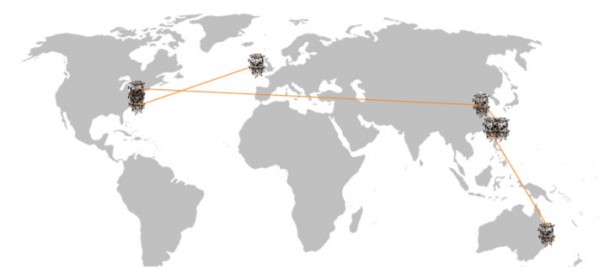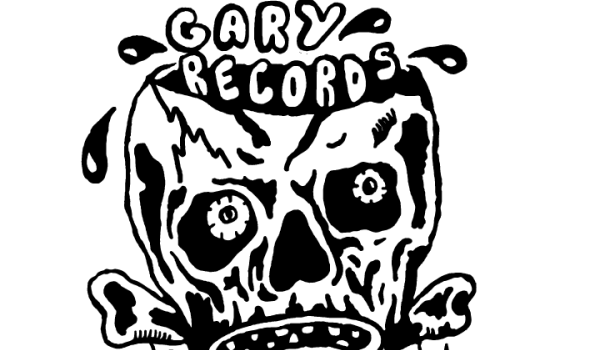Emerging Chicago-based label Gary Records has set forth with a mantra that turns locality on its ear. The homegrown duo behind the imprint are focused on stalking, catching and then releasing the best underground international music they’re sure you’ve never heard of in the form of split 7-inch vinyl.
What this translates into on a practical level is a formula that reads something like: Find two bands, each from a different country and often with a language barrier and then coordinate recording, artwork, promotion and shipping between the two groups and the label via the internet.
Robyn Chang and Kelley Scott–the two brains and four ears behind Gary (a moniker first adopted as the result of a drunken, yet fruitful image search for regular guys named Gary)–shared how the efforts that have culminated in the creation of their label are not only labors of love, but have been rife with logistical headaches, enjoyably long hours and surprises both pleasant and otherwise.
“You’re at a show, you pick up a record from a band you saw and you liked, you flip it over and here’s a band on the other side from another country playing complimentary music you would have never heard of,” Scott says, explaining the concept behind only releasing split vinyl.
Being put out by a label that’s so pro-artist is a pipe dream for many bands. If you’re in a band that works with Gary, the release costs you nothing, you receive free records, international distribution via the label’s growing roster of record stores that stock their back catalog, and receive treatment that the label owners liken to “taking care of your children.” The catch is, Gary has to find you first.
“Looking for artists in Europe is fine, but you can’t type in Chinese so unless bands are listing in English you wouldn’t even know how to find them,” Chang says. One of the biggest hurdles in making international music connections for the label has been ferreting out the most efficient channels in each country through which they can hone in on fresh talent. Scott likens it to the thrill of a chase:
“It’s that treasure hunt. Finding that band and thinking: ‘Fuck. This is awesome. How does no one know about this?’”
“People use different platforms in different places,” Chang says. Services such as IndieVox or Street Voice that are commonly used in places like Taiwan are almost completely unknown in the states. Deezer (a service comparable to Spotify that is still unavailable in the United States) is widely used for artist discovery and file sharing outside of the English-speaking world.
Chang, who traveled to Taiwan in 2011 for work, found herself unable to make any headway in tapping into the local music scene. In perhaps the most fortuitous pick-up game of Ultimate Frisbee she will ever play, she met a fellow American who was familiar with the underground music scene.
“It turns out really the only outlets bringing new music to the kids there are the ex-pats,” she says. These “ex-pats” often find themselves moving to Eastern countries in order to teach English or travel. As they become involved in local culture they often become unwitting satellites for exchanging music, receiving and transmitting bands and tracks to and from home to the local listeners. Over the course of her trip she realized that her struggle to break the language barrier and find new sounds from different cultures was mirrored in the local youths who aimed to do the same, only in reverse.
“It’s so interesting to see how music really travels. There’s a huge delay.” She credits this experience as the watershed moment, confirming that international bands would be a focus for the musical endeavor she hoped to eventually pursue.
Aside from the unexpected twists and turns in communication and logistics that come along with the strict doctrine of only releasing international split vinyl for bands they usually meet on the internet, the two still toil with the day-to-day struggles that face any other imprint.
“People think, I’m just gonna start a label. I’ll just get these recordings and get my friend to do artwork and then send it to pressing and that’ll be it. Oh no, wait. Now we have to handle shipping, production, online and product design. You should see my Google doc.”
They shared the Google document–chock full of schedules, calendars, projections, to-dos, and all manner of notes, it seems the two are nothing if not unflinchingly organized and endearingly obsessive.
“Figuring out our process has been the hardest part for me,” Scott says. Chang admits to being overly “Type A,” but stresses that the work load–handling upkeep such as creating written content for the site and communicating with bands and press for promotion–is split down the middle.
Building the framework for an international music community is possibly the dream most near and dear to the hearts behind Gary. The label releases monthly audio shows featuring strings of new tracks from bands they come across playing a wide variety of genres from all over the place. These cleverly named “Abroadcasts” are free to stream to via their site. Chang also keeps meticulous directories and spreadsheets of all contacts the label is involved with in any capacity. Whether blogs they’ve corresponded with, bands they’ve spoken to, or record stores that stock Gary’s vinyl in other countries, these records serve as pins on the world map so the label can point anyone they work with in a useful direction and hopefully achieve more together.
“We want people to go to New Zealand and come to our blog and see a list of record stores or bands or promoters that they can get in touch with for anything,” Chang says. The two agree that though the man-hours don’t necessarily feel like work, the never-ending process can be draining, and while the mantra that sets them apart from their peers also implies that they have to turn down certain opportunities to release bands that don’t fit into their concept, it’s still a wholly rewarding experience.
“I want to take these smaller bands and break them, get them into the hands of bigger labels,” Chang says.
Both contributors to the label are also currently working on degrees, Scott attends law school and Chang is finishing a Master’s in Integrated Marketing Communication. Their venerable educations make the idea of maintaining the imprint successfully in the years to come seem like a tangible possibility.
Toward the end of the conversation Chang pulled up Gary’s “map of world domination,” a color coded world map with lines from country to country delineating bands who are on splits together and countries that they hope to explore further for upcoming releases. While the two are hesitant to specify exactly how many releases they’re hoping to put out each year, they made it apparent that their train never stops rolling. Since September of 2013 Gary Records has released two splits, the first featuring Forests (Taipei) and White Lodge (Australia), the second Shape Breaker (Philadelphia) and Fuck Mountain (Dublin). Their third split, slated for April of this year, will feature Skip Skip Ben Ben (Taipei) and Hot & Cold (Beijing/Toronto).
With each release the label garners more clout and ushers new listeners through the audio channels opening between cultures and continents. But, no, one of those cultures is not Gary, Indiana.



